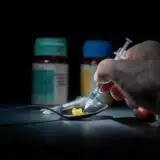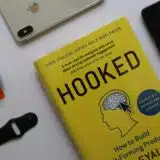What is Addiction?

Addiction is when someone’s reward circuitry causes and encourages repetitive behavior (or abuse) of certain substances which are ultimately detrimental to the person. This cyclic consumptive behaviour amplifies over time leading to the individual feeling like a passenger of their own overwhelming impulses. Common addictions include drugs, alcohol and fast food. Addiction however can be triggered by any number of factors that light up the reward receptors in your brain. Other addictions include sex, exercise, video games and even eating ice – known as pagophagia.
There are many commonalities with the formulation of addictions even though the variations are quite broad. We have a reward and reinforcement pathway in our brain that uses the neurotransmitter known as dopamine. Our brain’s response to dopamine is similar to that of a rat pressing a button for food. From ancient times we humans as a survival mechanism would receive a sense of achievement when accomplishing something. For example if there was a piece of fruit high in a tree and a human managed to climb it and get the fruit, we would get a good feeling to encourage the behavior again. Likewise when someone gets a raise at work they also get a feeling of joy. That is dopamine. However, in the modern world where feelings of satisfaction are far easier to receive and we don’t spend most of our lives just trying to scrounge up enough food to survive, we can overcook and abuse this reward circuitry. iIf someone is watching porn, for example, and gets a good feeling, they may wish to repeat the behaviour and therefore the feeling. This can end up quite repetitive however, inevitably the “good feeling” diminishes as the release of dopamine decreases. That ultimately results in the person chasing a substitute to achieve the desired high.
Addiction does not affect some people as much as others and it is clear some are more at risk of developing addictive behavior than others.People who suffer from anxiety, depression or other pre existing issues are typically more susceptible. Once an addiction takes hold it’s common for the addict to be oblivious of the detrimental behaviour they’re displaying. This is due to the mind-altering effects their drug dujour has on their executive functions, effectively blinding them from the truth.
Those who are suffering from addiction often feel a prevalence of guilt and shame particularly during the more non-euphoric cyclic moments. Recovery however is more than possible, with a majority of addicts finding that path.Due to a high level of relapse, addiction is never considered to be cured, but rather the addict being in recovery. There is nothing to be ashamed of however by relapsing. Many addicts have tried numerous times and relapsed, but on the very next time found a way out. Although some have done it alone, recovery is most likely a very long, difficult road, filled with pain and hurt most successfully achieved through professional and peer group therapy. Typically those who achieve recovery for more than five years are as likely to “use” as any person from the general population.
Myths About Addiction:

Myths about addiction include that it is a choice. Though in most cases the original action is a choice, usually the path to addiction is one of losing control and sense of agency along with it. Very few will honestly say that they want to be an addict. Looking at their behaviour without the knowledge of their personal circumstances, however, would suggest the contrary.
Another major myth about addiction is that addicts are bad people. In reality, it is the addiction not the addict that manifests the undesirable behaviour. Addiction is a chronic illness that can destroy people, families and sometimes strangers. Although not always pleasant, the only real choice is the path to recovery.
Symptoms Of Addiction:

Many people have been incorrectly labelled an addict due to uncharacteristic behavioural compulsions. Addiction is clinically diagnosed by the presence of at least two out of a number of factors. The extent of the disorder is measured on the number of symptoms present with two to three meaning mild, four to five moderate and anything above six severe.:
- The desire to slow down the activity or failed attempts to do so.
- Behaviour or pursuit around the addiction uses a lot of time.
- Cravings for the subject of addiction.
- Using more or for longer than intended.
- Continuing while knowing the addiction is having detrimental consequences on your own body or mind.
- Diminishing effects of the same amount of the addiction driving you to chase the same high.
- The addicts pursuit or activity negatively affects other parts of life such as work, their relationships or one’s education .
- Continuing the addiction despite it negatively affecting interpersonal connections.
- No longer participating in work, social or recreational activities.
- Taking greater risks to use or feed the addiction.
- Feelings of withdrawal.
Recovery From Addiction:

Recovery from addiction may, to some, feel so unachievable that it is futile to even commence the journey. Even for those who do manage to make a move away from the cycle of their addiction, progress can seem so fleeting or difficult making relapsing the easier alternative. Relapse, although fairly common in the recovery process is not always present and is certainly not a determining factor. Every individual will have a different journey to recovery. The greatest chance of success includes early diagnosis, early treatment, the best internal and external support and, most importantly, a genuine desire and a strong resolve to achieve your goal of recovery. Not everyone is ready to make a change and external pressures or influences may exacerbate the problem by enabling behaviours that create frustration and resentment. The responsibility of the individual however will ultimately see the fruition of recovery.
















